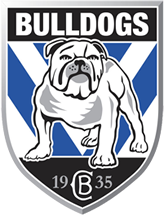Canterbury - Bankstown Bulldogs

The Canterbury-Bankstown Bulldogs are an Australian professional rugby league football club based in Belmore, a suburb in the Canterbury-Bankstown region of Sydney. They compete in the National Rugby League (NRL) premiership, as well as New South Wales Rugby League junior competitions.
The club was admitted to the New South Wales Rugby Football League premiership, predecessor of the current NRL competition, in 1935. They won their first premiership in their 4th year of competition with another soon after, and later went through a very strong period in the 1980s, winning four premierships in that decade.
Known briefly in the 1990s as the Sydney Bulldogs, as a result of the Super League war the club competed in that competition in 1997 before continuing to play every season of the re-unified NRL, winning their most recent premiership in 2004.
In 1935 - thirteen years after a meeting above "The Ideal Milk Bar" in Campsie led to the creation of the Canterbury-Bankstown Junior Rugby League - the Canterbury club was admitted into the elite New South Wales Rugby Football League premiership. It took the new club, nicknamed "Country Bumpkins" because of their rural recruiting and CB emblem, just three years to win their first premiership in 1938. The grand final-winning effort was repeated again in 1942 before a 25-year drought set in.
In 1967, having ended the 11-year premiership reign of the great St.George by knocking them out in the final, "The Berries" (as they were known at the time) went down to the South Sydney Rabbitohs in the grand final. But the return to the top end of the table set the scene for off-field restructuring that laid the foundations for the club to become one of the most consistent achievers in the remaining decades of the 20th century.
In 1978 Canterbury became known as "The Bulldogs". Nicknames such as "Cantabs" "CBs" and "Berries" were seen to be "soft" and the club wanted something to signify determination and grit. A grand final appearance in 1979, followed by a grand final win in 1980 with a young, enthusiastic and free-running side dubbed "The Entertainers", was the beginning of a golden era that was to produce three more grand final wins in the 80s: 1984, 1985 and 1988.
In the mid-1990s' Super League war, the Bulldogs aligned themselves with the Super League competition, playing in the inaugural and only 1997 premiership season. In 1998 the Bulldogs came close to adding another trophy to the cabinet after battling their way to the Grand Final where they met the Brisbane Broncos and went down 38-12. On the way to the 1998 Grand Final, the Bulldogs launched two stunning comebacks, first against the Knights in the third week of the finals - down 16-0 in the second half, they fought back to 16-all at fulltime and went on to win in extra time.
A week later they trailed Parramatta in the preliminary final by 16 points with just 9 minutes remaining. Three quick tries and a high pressure conversion in the final minutes got them back level at 18-all, and the Bulldogs eventually went on to victory following a brilliant try from Rod Silva.
Following indifferent form in 1999, 2000 and 2001 which all saw varying levels of success, the club was found to have systematically and deliberately breached the NRL salary cap in 2002, and was docked all 37 competition points which it had amassed up to that point in the season.
This resulted in the club falling from first to last place on the ladder, and at the end of the season the Bulldogs received their first "wooden spoon" (a reference given to the club which finishes last in the competition) in several decades.
